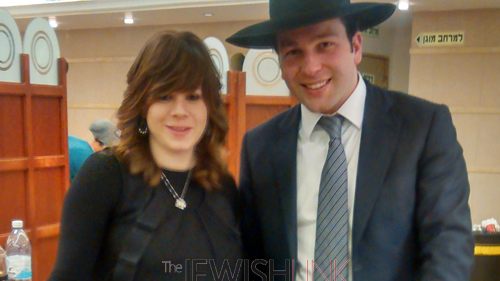Day After Deadly Attack, Family Holds Brit at Har Nof Synagogue
It was business as usual at the Jerusalem synagogue on Wednesday morning following the devastating Palestinian terror attack that left four rabbis and a Druze policeman dead the previous day. The morning Shacharit prayer services were full of worshipers and men studying Torah, as security guards and border police milled around the area.
But the Haredi community of Jerusalem’s Har Nof community is still reeling.
“We are in shock,” said Haredi resident of the Har Nof neighborhood, Brachi, 19, to Tazpit News Agency. “I live down the street from the synagogue and it was horrifying to wake up yesterday and hear the attack.”
“The men who were murdered didn’t do anything bad – they were just praying to God,” she said. “It’s so difficult to understand. I couldn’t wait for yesterday to end and to see the sun rise again today – just to be able to start over.”
But even with the cloud of sadness that descended on Jerusalem’s Har Nof neighborhood, as the community mourned the gruesome murders and the bloodied synagogue, there was a spark of happiness felt – in the synagogue itself.
Shula and Dov Sorotzkin, Haredi residents of Har Nof, decided to hold the brit mila or ritual circumcision of their son, Eliyahu Meir, at the Kehillat Bnei Torah synagogue, where the attack took place 24 hours earlier.
“We woke up yesterday to the sounds of gunfire,” Dov Sorotzkin told Tazpit News Agency. The couple, who live right next to the synagogue, decided that despite the bloody attack, their synagogue was the best place to perform the brit mila of their newborn son.
“We chose to do the brit here today because of the symbolism that this place holds, especially in light of this important religious ceremony for our people. The brit mila is about the covenant and connection between God and the Jewish people,” Sorotzkin told Tazpit.
“The rabbis who were here yesterday were killed in the middle of a conversation with God, but we are here today, continuing that connection,” said Sorotzkin.
Dov, the youngest in a family of nine children, decided to name his son, Eliyahu Meir after his great-grandfather Rabbi Eliyahu Meir Bloch who fled Lithuania after his famous Telshe Yeshiva, founded in 1875, was destroyed in the Holocaust. The yeshiva was re-established near Cleveland, Ohio after many of the students and faculty members had fled Lithuania.
For Sorotzkin’s father, Yosef, the brit mila of his grandson is a sign of faith. “We are doing what the Jewish people have done throughout history; every time there has been death and destruction, we keep moving and creating,” he told Tazpit.
By Anav Silverman
Tazpit News Agency
